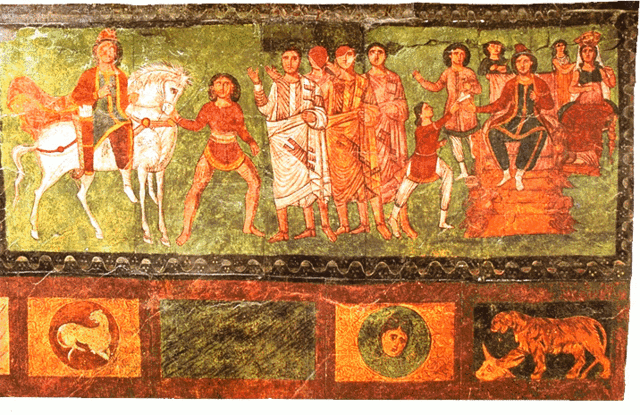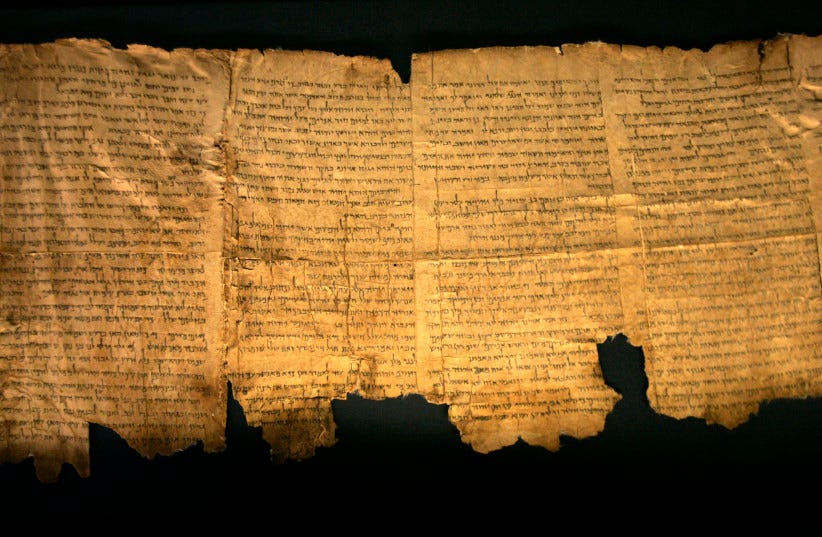A Song for the Headlines
A New Commentary of Psalm 67.
“I hope they like it,” thought Eliezer, making some final corrections to his song. He knew that its lyrics came from his heart. He was pretty sure it would help others to express what was in their hearts as well: the longing for this moment of peace and prosperity that they were experiencing to spread to all nations.
It was the 6th of Sivan 2761 according to Eliezer’s calendar, June 2, 1000 BC by our own Gregorian calendar. Israel was united after a very chaotic time. They had traded the up-and-down leadership of the Judges for a Monarchy. The Monarchy was a difficult transition. Their first King, Saul, started out well but his growing mental illness precipitated the decline of his rule and of Israel’s fortunes as well. The transition to their second King, King David, was drawn out and divisive. But all of that was history now. The Israelites were united together as a people and strong enough to secure their borders against potential enemies. At least for now. That made this just the right moment for Eliezer’s song.
Eliezer and his family were celebrating Shavuot in Jabesh-Gilead with the tribe of Manasseh. Their harvest celebration was particularly boisterous this year. The crop yield had been quite good. It wasn’t the best ever, but the abundance of their prayers and celebration meals made it clear that they would have full bellies through the coming season.
Speaking of full bellies, most people had been resting for the last couple of hours. But the joy of this celebration filled Eliezer to overflowing. He couldn’t rest. He had to express what he was feeling in song.
But where should he begin? One of the blessings from the harvest festival had captivated his imagination. He knew it was more than 200 years old, from a time before his family had arrived in this abundant land. The words and phrases did such an amazing job of leading the people to that thing that they longed for more than anything else: peace.
Eliezer repeated the blessing to himself again:
The Lord bless you and keep you;
the Lord make his face shine upon you
and be gracious to you;
the Lord turn his face towards you
and give you peace. 1
They had that peace in their land right now - not just the absence of war but the fullness of life - children, property, land, good health, and God’s presence. This is where his song would have to begin.
Eliezer put pen to paper and wrote:
May God be gracious to us and bless us
and make his face shine on us –
But his song wasn’t simply a blessing. It was also a prayer. Anyone could look at the history of his people and see that the blessing of one generation turns into violence and war in the next. Even though he was still young, Eliezer wondered if his children would experience the peace he was experiencing now. He knew that it would all depend, not only on Israel’s internal politics but on the politics of the peoples and nations that surrounded them. There would have to be peace with them as well.
Eliezer was named after a Gentile. Eliezer of Damascus was a servant of Abraham. His hometown of Damascus had a chaotic history of its own. It had once been ruled by King Biryawaza, followed by the Hittites, then the Egyptians, and more recently by people who had come from various countries across the sea. Some even said that Abraham himself ruled over that area before all of these people. “That is the way of this land,” Eliezer said to himself, “ chaos not only for the Jew but for the Gentile.”
As a child, Eliezer’s parents had told him all of these stories about his namesake as well as the struggles of his own people. But they told these stories of wars and rumors of wars in such a way that they were the background to a much greater adventure; the adventure of following the God of Abraham, Isaac, and Jacob through all of the chaos to the promised land. Eliezer of Damascus became a follower of God. He had taught other Gentiles to believe in God as well.2 Through people like Abraham and Eliezer of Damascus, God’s promise to Abraham spread to other peoples. This was the hope. A hope for a time will come when God’s promise will be fulfilled and everyone, Jew and Gentile alike, will be united under the blessing of God. Then there will be a peace that lasts for generations.
May the peoples praise you, God;
wrote Eliezer,
may all the peoples praise you.
This would be the chorus of his song.
It was coming together now. His song would begin with the blessing, then the prayer for the fulfillment of God’s promise to Abraham, then the first chorus followed by a sketch of what the world will be like on that day.
He read back to himself what he had written thus far:
May God be gracious to us and bless us
and make his face shine on us –
so that your ways may be known on earth,
your salvation among all nations.
May the peoples praise you, God;
may all the peoples praise you.
May the nations be glad and sing for joy,
for you rule the peoples with equity
and guide the nations of the earth.
“The Lord can do this!” Eliezer told himself excitedly. He looked at everyone resting around him. They were so content. “We have been through so much since we were slaves in Egypt. But look at how blessed we are! Think of what could happen if our blessing is shared with the whole world!”
He worked a little bit more on his song, making a more obvious connection to the harvest festival and then adding what he hoped would be a powerful conclusion.
“At the completion of the first rendition of the song, there was silence. “
The time had come. Eliezer’s tribe had regathered for another celebration. He stood before them with the lyrics to his song in hand. “Here it goes. I hope they like it.”
At the completion of the first rendition of the song, there was silence. Then the people responded with shouts of joy. Not just his parents and grandparents, but everyone. So much so that in a flight of fancy, Eliezer thought to himself, “Maybe my song will be remembered in future celebrations!”. But his conscience warned him to stay humble.
That would have been difficult if Eliezer had known what would happen with his song. It would be included with other hymns, written by the likes of King David, in a collection of songs and prayers that would strengthen his people, through the rise and fall of the Kingdom of Israel, through the Babylonian captivity under Nebuchadnezzar, through their release and rebuilding under the Persian King Cyrus, all the way through the oppression of Rome.
It would be repeated by Jesus of Nazareth to his disciples. By his disciples to people in other countries and lands. It was translated into the language of the Syrians, the Egyptians, the Palestinians, the Iraqi heirs of Babylon, and the Iranian heirs of Persia. The song was remembered by Jews and Gentiles during revolutions and pogroms, World Wars and concentration camps, murders and genocide. It has been sung by people all over the world who, like Eliezer, long to beat swords into plowshares by sharing the blessing of God with others.
It is ours today, to sing it with Jews and Gentiles around the world in our time, as a blessing and a prayer for the headlines.
May God be gracious to us and bless us
and make his face shine on us –
so that your ways may be known on earth,
your salvation among all nations.
May the peoples praise you, God;
may all the peoples praise you.
May the nations be glad and sing for joy,
for you rule the peoples with equity
and guide the nations of the earth.
May the peoples praise you, God;
may all the peoples praise you.
The land yields its harvest;
God, our God, blesses us.
May God bless us still,
so that all the ends of the earth will fear him.
Numbers 6:24-26
Talmud, Yoma 28b




Uplifting and beautiful. Thank you!